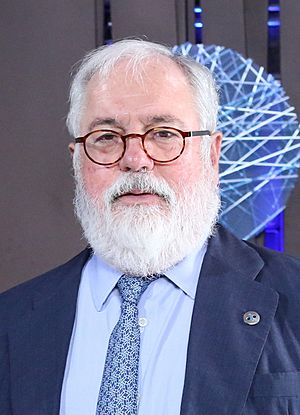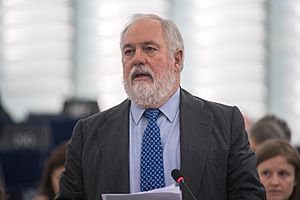Miguel Arias Cañete facts for kids
Quick facts for kids
The Most Excellent
Miguel Arias Cañete
|
|
|---|---|

Arias Cañete in 2017
|
|
| European Commissioner for Climate Action | |
| In office 1 November 2014 – 30 November 2019 |
|
| President | Jean-Claude Juncker |
| Preceded by | Connie Hedegaard |
| Succeeded by | Frans Timmermans |
| European Commissioner for Energy | |
| In office 1 November 2014 – 30 November 2019 |
|
| President | Jean-Claude Juncker |
| Preceded by | Günther Oettinger |
| Succeeded by | Kadri Simson |
| Minister of Agriculture of Spain | |
| In office 22 December 2011 – 28 April 2014 |
|
| Prime Minister | Mariano Rajoy |
| Preceded by | Rosa Aguilar |
| Succeeded by | Isabel Garcia Tejerina |
| In office 28 April 2000 – 18 April 2004 |
|
| Preceded by | Jesús Posada |
| Succeeded by | Elena Espinosa |
| Member of the European Parliament | |
| In office 1 July 2014 – 31 October 2014 |
|
| Constituency | Spain |
| In office 1 January 1986 – 19 July 1999 |
|
| Constituency | Spain |
| Personal details | |
| Born | 24 February 1950 Madrid, Spain |
| Political party | People's Party People's Alliance |
| Spouses | Micaela Domecq y Solís- Beaumont |
| Children | 4 |
| Alma mater | Complutense University |
Miguel Arias Cañete (born 24 February 1950) is a Spanish politician. He served as a top official in the European Union, specifically as the European Commissioner for Energy and Climate Action. This role was part of the Juncker Commission, a group of leaders who managed the European Union's policies from 2014 to 2019.
Before his work in the European Union, Arias Cañete was a member of the Spanish People's Party. He held an important job in the Spanish government as the Minister for Agriculture, Food and Environment from 2011 to 2014. After that, he was chosen to lead his party's group in the European Parliamentary elections.
Contents
Early Life and Education
Miguel Arias Cañete was born in Madrid, Spain. His father, Alfonso Arias de la Cuesta, was a judge. Miguel went to school in Madrid, first at a Jesuit school. Later, he studied Law at the Universidad Complutense, which is a well-known university.
Political Career
After finishing his studies in 1974, Arias Cañete joined the Spanish Civil Service. This meant he worked for the government. His first job was in the Spanish Tax Agency in Jerez de la Frontera, a city in Spain. Later, he moved to the office in Cadiz. In 1978, he left his government job to become a professor. He taught Law at the University of Cádiz until 1982.
Entering Politics
Arias Cañete started his political journey in 1982 with a group called the People's Alliance (AP). He became a member of the Parliament of Andalusia, which is like a regional government, representing the area of Cádiz. He served there from 1982 to 1986. He also joined the AP's main leadership team.
When Spain joined the European Economic Community (now the European Union) in 1986, he became a member of the European Parliament. This is a group of elected officials who represent people across Europe. He was first appointed and then elected in 1987. He worked in the European Parliament until 1999. During this time, he led committees focused on agriculture and regional policies.
From 1993 to 2000, he was a member of the Spanish Senate, which is part of Spain's national parliament. Then, in 2000, he was appointed as the Minister of Agriculture and Fishing by the Prime Minister at the time, José María Aznar.
Roles in Spanish Government
Arias Cañete tried to become the mayor of Jerez de la Frontera in 1995 and 1999, but he was not successful. However, he did serve as a city council member in the opposition from 1995 to 2000.
He was elected as a Senator for Cádiz again from 2000 to 2004. From 2004 to 2008, he was a Deputy for Cadiz in the Spanish Congress, another part of the national parliament. During this time, he also took on more important roles within the People's Party, becoming "Economic Secretary" and president of its Electoral Committee.
In 2008, he was elected to represent Madrid in the Spanish Congress and also became a Member of the European Parliament for the Electoral District Madrid. He held these positions until 2014.
Minister of Agriculture, Food and Environment (2011–2014)
In 2011, Mariano Rajoy, who was the Prime Minister of Spain, appointed Arias Cañete as the Minister of Agriculture, Food and Environment. He had been the agriculture minister before (from 2000 to 2004), but this time, the environment was also part of his responsibilities.
During his time as minister, Arias Cañete helped pass a law in 2013. This law changed rules about building near the coast.
European Commissioner for Climate Action and Energy (2014–2019)
In 2014, Prime Minister Rajoy chose Arias Cañete to lead the People's Party's list for the European elections. After these elections, Spain nominated him to be part of the Juncker Commission. This is the main executive body of the European Union.
In September 2014, Jean-Claude Juncker, the President of the European Commission, gave Arias Cañete the job of European Commissioner for Climate Action and Energy. This was a new role that combined two important areas: climate change and energy. He started this job on 1 November 2014. In this position, he worked under Maroš Šefčovič, who was the Vice-President of the European Commission for Energy Union.
He represented the European Union at important international meetings about climate change. These included the 2014 United Nations Climate Change Conference in Lima and COP21 in Paris, where the Paris Agreement was signed. After the Paris Agreement, a big part of his job was to update the European Union's climate and energy rules to meet the goals set in the agreement.
Arias Cañete also helped introduce new climate policies. These included rules for reducing greenhouse gas emissions from different sources and a regulation about how land use affects greenhouse gases (LULUCF). He was also in charge of a plan to improve the European Union Emission Trading Scheme, which is the world's largest system for trading carbon emissions.
In 2015, Arias Cañete started a plan to make the Mediterranean region a major hub for natural gas. This was part of the European Union's effort to rely less on Russia for oil and gas. Soon after, he helped create an agreement between France, Spain, and Portugal for the MidCat gas pipeline. This pipeline was meant to help more gas from Algeria reach Europe.
In 2016, Miguel Arias Cañete met with Berat Albayrak, the Minister of Energy for Turkey. They met at the "Second Meeting of the Turkey-EU High Level Energy Dialogue." During this meeting, Minister Albayrak mentioned that they had restarted talks about opening the Energy Chapter with the European Union. This chapter is a step in Turkey's process to join the EU.
Minister Albayrak also invited Arias Cañete to the World Energy Congress in Istanbul in October 2016.
Later Career
In June 2019, Arias Cañete announced that he would end his political career when his term as commissioner finished on 1 November 2019. He said he planned to retire to his home in Jerez de la Frontera and spend time with his grandchildren.
Since then, he has been involved in other activities:
- He is a member of the jury for the Gulbenkian Prize for Humanity.
- He has been an independent member of the board of directors for Balam Agriculture since 2021.
- He has been a member of the Board for Beka Finance since 2021.
Personal Life
Miguel Arias Cañete comes from a Spanish noble family. He is married to Micaela Domecq y Solís-Beaumont, and they have four children. His wife's family is also aristocratic and has lived in the Jerez de la Frontera region of Andalusia for a long time. They own large farms and ranches, including those for breeding fighting bulls. They are also known for a famous brand of fortified wines.
Recognition
 Grand Cross of the Order of Charles III (2004)
Grand Cross of the Order of Charles III (2004) Grand Cross of the Order of Civil Merit (2011)
Grand Cross of the Order of Civil Merit (2011) Chevalier, Ordre du Mérite agricole
Chevalier, Ordre du Mérite agricole Knight, Sovereign Military Order of Malta
Knight, Sovereign Military Order of Malta
See also
 In Spanish: Miguel Arias Cañete para niños
In Spanish: Miguel Arias Cañete para niños
 | Kyle Baker |
 | Joseph Yoakum |
 | Laura Wheeler Waring |
 | Henry Ossawa Tanner |


